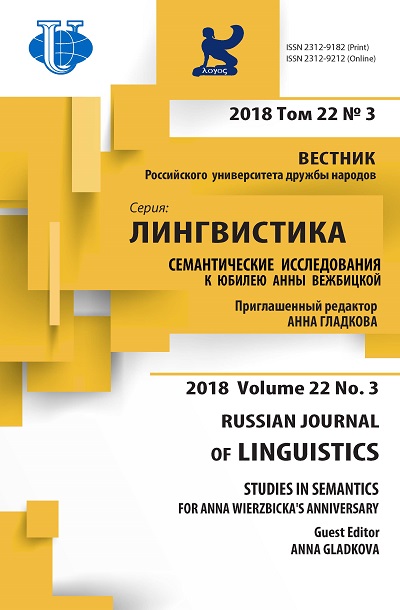A Semantic Menagerie: The Conceptual Semantics of Ethnozoological Categories
- Authors: Goddard C.1
-
Affiliations:
- Griffith University
- Issue: Vol 22, No 3 (2018): Studies in semantics: for Anna Wierzbicka’s anniversary
- Pages: 539-559
- Section: STUDIES IN SEMANTICS: For Anna Wierzbicka’s anniversary
- URL: https://journals.rudn.ru/linguistics/article/view/19346
- DOI: https://doi.org/10.22363/2312-9182-2018-22-3-539-559
- ID: 19346
Cite item
Full Text
Abstract
About the authors
Cliff Goddard
Griffith University
Email: c.goddard@griffith.edu.au
Professor of Linguistics at Griffith University. He is a leading proponent of the Natural Semantic Metalanguage approach to semantics and its sister theory, the cultural scripts approach to pragmatics, also known as ethnopragmatics. His recent publications include the edited volume Minimal English for a Global World (2018 Palgrave), Words and Meanings: Lexical Semantics Across Domains, Languages and Cultures (co-authored with Anna Wierzbicka; 2014 OUP), the textbook Semantic Analysis (2nd ed., 2011 OUP) and Ten Lectures on Natural Semantic Metalanguage (2018 Brill). 170 Kessels Road, Nathan, Queensland 4111 Australia
References
- Apresjan, Ju D. (1969). O yazyke dlya opisaniya znachenii slov. Izvestiya Akademii Nauk SSSR, Seriya Literatury i Yazyka, 28, 415-28.
- Apresjan, Ju D. (1992[1974]). Lexical Semantics: User’s Guide to Contemporary Russian Vocabulary. Ann Arbor: Karoma. [Orig. published in 1974 as Leksicheskaya semantika - sinonimicheskie sredstva yazyka (In Russ.), Moskva: Nauka].
- Apresjan, Ju D. (2000). Systematic lexicography. (Windle, K. Trans.). Oxford: Oxford University Press.
- Atran, S. (1990). Cognitive foundations of natural history. Cambridge: Cambridge University Press.
- Berlin, B. (1992). Ethnobiological classification: Principles of categorization of plants and animals in traditional society. Princeton, N.J.: Princeton University Press.
- Bromhead, H. (2011). The bush in Australian English. Australian Journal of Linguistics, 31, 445-471.
- Brown, C. (1979). Folk zoological life forms: Their universality and growth. American Anthropologist,81, 791-817.
- Goddard, C. (ed.). (2008). Cross-linguistic semantics. Amsterdam: John Benjamins.
- Goddard, C. (2009). Cultural scripts. In Senft, G., Östman, J-O, & Verschueren, J. (eds.), Culture and language use. Amsterdam: John Benjamins, 68-80.
- Goddard, C. (2011). Semantic analysis. A practical introduction. Revised 2nd edition. Oxford: Oxford University Press.
- Goddard, C. (2012). Semantic primes, semantic molecules, semantic templates: Key concepts in the NSM approach to lexical typology. Linguistics, 50(3), 711-743.
- Goddard, C. (2016). Semantic molecules and their role in NSM lexical definitions. Cahiers de lexicologie 2016-2, No 109, 13-36.
- Goddard, C. (2017). Furniture, vegetables, weapons: Functional collective superordinates in the English lexicon. In Ye, Z. (ed.) The semantics of nouns. Oxford: Oxford University Press, 246-281.
- Goddard, C. (2018). Minimal English: The science behind it. In Goddard, C. (ed.) Minimal English for a global world: Improved communication using fewer words. London: Palgrave Macmillan, 29-70.
- Goddard, C. & Wierzbicka, A. (eds.) (2002). Meaning and universal grammar: Theory and empirical findings, 2 vols. Amsterdam: John Benjamins.
- Goddard, C. & Wierzbicka, A. (2014). Words and meanings: Lexical semantics across domains, languages and cultures. Oxford: Oxford University Press.
- Haviland, J. B. (1974). A last look at Cook’s Guugu-Yimidhirr wordlist. Oceania, 44 (3), 216-232. [http://pages.ucsd.edu/~jhaviland/Publications/HavilandOceania.pdf]
- Kripke, S. (1977). Naming and necessity. In Davidson, D. & G. Harman (eds.), Semantics of natural language. Dordrecht: Reidel, 253-355.
- Hare, B., Brown, M., Williamson, K. & Tomasello, M. (2002). The domestication of social cognition in dogs. Science 298, 1634-1636.
- Rosch, E. (1977). Human categorization. In Warren, N. (ed.), Advances in cross-cultural psychology.Vol. 1. London: Academic Press, 1-49.
- Rosch, E. (1978). Principles of categorization. In Rosch, E. & B. Lloyd (eds.), Cognition and categorization. Hillsdale, NJ: Lawrence Erlbaum, 27-48.
- Wierzbicka, A. (1985). Lexicography and conceptual analysis. Ann Arbor: Karoma. Wierzbicka, A. (1996). Semantics: Primes and universals. New York: Oxford University Press.
- Wierzbicka, A. (2007). Bodies and their parts: An NSM approach to semantic typology. Language Sciences, 29(1), 14-65.
- Wierzbicka, A. (2009). The theory of the mental lexicon. In Kempgen, S., P. Kosta, B. Tilman & I. Gutschmidt (eds.), The Slavic languages: An international handbook of their structure, their history and their investigation. Berlin: Mouton de Gruyter, 848-863.
- Wierzbicka, A. (2013). Polish zwierzęta ‘animals’ and jabłka ‘apples’: an ethnosemantic inquiry. In Głaz, A., Danaher, D.S. & Łozowski, P. (eds.), The linguistic worldview: Ethnolinguistics, cognition, and culture. London: Versita, 137-159.
- Wierzbicka, A. (2014). Imprisoned in English: The hazards of English as a default language. New York: Oxford University Press.
- Wierzbicka, A. (2015). Language and cultural scripts. In Sharifian, F. (ed.), The Routledge handbook of language and culture. Routledge, 339-56.
- Ye, Z. (ed.). (2017). The semantics of nouns. Oxford: Oxford University Press.
Supplementary files















